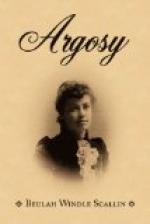“The play, dear Major Strickland!” said Janet, with a sudden flush and an eager light in her eyes; “but would Sister Agnes approve of my going to such a place?”
“I scarcely think, poverina, that Sister Agnes would disapprove of any place to which I might choose to take you.”
“Forgive me!” cried Janet; “I did not intend you to construe my words in that way.”
“I have never construed anything since I was at school fifty years ago,” answered the Major, laughingly. “Can you tell me now from your heart, little one, that you would not like to go to the play?”
“I should like very, very much to go, and after what has been said I will never forgive you if you do not take me.”
“The penalty would be too severe. It is agreed that we shall go.”
“To me it seems only seven days instead of seven years since I was last driven through London streets,” resumed Janet, as they were crawling up Fleet Street. “The same shops, the same houses, and even, as it seems to me, the same people crowding the pathways; and, to complete the illusion, the same kind travelling companion now as then.”
“To me the illusion seems by no means so complete. To London Bridge, seven years ago, I took a simple child of twelve: to-day I bring back a young lady of nineteen—a woman, in point of fact—who, I have no doubt, understands more of flirtation than she does of French, and would rather graduate in coquetry than in crochet-work.”
“Take care then, sir, lest I wing my unslaked arrows at you.”
“You are too late in the day, dear child, to practise on me. I am your devoted slave already—bound fast to the wheel of your triumphant car. What more would you have?”
The hotel was reached at last, and the Major gave Janet a short quarter of an hour for her toilette. When she got downstairs dinner was on the point of being served, and she found covers laid for three. Before she had time to ask a question, the third person entered the room. He was a tall, well-built man of six or seven and twenty. He had light-brown hair, closely cropped, but still inclined to curl, and a thick beard and moustache of the same colour. He had blue eyes, and a pleasant smile, and the easy, self-possessed manner of one who had seen “the world of men and things.” His left sleeve was empty.
Janet did not immediately recognise him, he looked so much older, so different in every way; but at the first sound of his voice she knew who stood before her. He came forward and held out his hand—the one hand that was left him.
“May I venture to call myself an old friend, Miss Hope? And to trust that even after all these years I am not quite forgotten?”
“I recognise you by your voice, not by your face. You are Mr. George Strickland. You it was who saved my life. Whatever else I may have forgotten, I have not forgotten that.”
“I am too well pleased to find that I live in your memory at all to cavil with your reason for recollecting me.”




